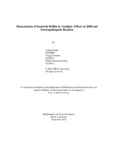Resuscitation of bacterial biofilm by sunlight : effects on different enteropathogenic bacteria
Abstract
Bangladesh encounters seasonal cholera endemics biannually. Vibrio cholerae and Shiga toxin-
producing Escherichia coli (STEC) is responsible for cholera and similar diarrheal disease
outbreaks. Biofilms go through a cycle of formation and degradation influenced by various
environmental conditions, and it is this degradation that contributes to increased numbers of
planktonic bacteria in water bodies. In this study, the effect of sunlight on resuscitation of
bacterial biofilm was investigated. Biofilm of Vibrio cholerae, three strains, and STEC were
subjected to sunlight exposure during wet season, June to August. The results demonstrate that
degradation of biofilm during these seasons, considered the off-season, occurs but is
insignificant when compared to summer season, considered the peak season of bacterial
infection. This can indicate that sunlight is a significant factor in biofilm resuscitation and
seasonal outbreaks of bacterial diseases. Including these seasonal results, around the year data
has been obtained for this study. However, replication would lead to a more insightful
conclusion.

